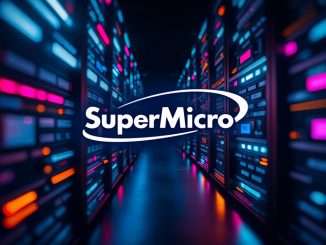- Super Micro Computer’s (SMCI) stock fell nearly 5% to $37.05 on Thursday but rose 1.40% to $37.57 in Friday’s early trading hours, reflecting a volatile year with a 23% year-to-date gain yet a 67% year-over-year drop from its $122.90 March 2024 peak.
- Broadcom’s (AVGO) strong Q1 earnings of $1.60 per share and $14.92 billion in revenue, with AI semiconductor revenue up 77% to $4.1 billion and a Q2 forecast of $14.90 billion, signal robust AI demand, while HPE’s (HPE) 18% stock drop to $14.82 after missing Q1 estimates by $0.01 highlights sector challenges.
- Super Micro’s popularity among retail investors, fueled by the AI trade and leveraged funds, drives its volatility, with its path forward tied to navigating tariff risks, accounting concerns, and the contrasting fortunes of AI peers like Broadcom and HPE.

Super Micro Computer (SMCI) is navigating a rocky landscape as its stock closed Thursday down nearly 5% at $37.05, though it edged up 1.40% to $37.57 in Friday’s early trading hours. The server maker’s performance reflects a year of extremes—up 23% year-to-date yet down over 67% year-over-year, a stark retreat from its March 2024 peak of $122.90 and even the $60 highs touched last month when it dodged delisting by meeting financial filing deadlines. Caught in the broader currents of the artificial intelligence (AI) trade, Super Micro’s trajectory mirrors the volatility and uncertainty rippling through the sector, with tariff risks and shifting infrastructure investment paces keeping investors on edge.
The AI ecosystem offers mixed signals for Super Micro’s outlook. Broadcom (AVGO), a key player in AI chips, provided a dose of confidence with its Thursday earnings, posting $1.60 per share and $14.92 billion in revenue for Q1 – surpassing expectations – fueled by a 77% surge in AI semiconductor revenue to $4.1 billion and a 47% jump in infrastructure software revenue to $6.7 billion. Looking ahead, Broadcom projects Q2 revenue at $14.90 billion, topping the $14.7 billion consensus, with AI semiconductor revenue expected to climb to $4.4 billion. This robust performance underscores sustained demand for AI-driven computing power, a tailwind that could buoy server makers like Super Micro, which thrives on supplying the hardware backbone for such technologies.
Contrastingly, Hewlett Packard Enterprise (HPE), another AI server maker, sent a shiver through the market as its stock cratered nearly 18% to $14.82 in Friday’s premarket trading, following a 4.92% drop to $17.96 the prior day. HPE’s Q1 earnings missed the mark by $0.01 against the $0.50 per share consensus, excluding non-recurring items and adjustments made for new tariffs on goods from China, Canada, and Mexico. This stumble highlights the fragility of the AI hardware space, where even slight missteps can amplify investor concerns, especially amid macroeconomic pressures like tariffs that threaten cost structures and margins. For Super Micro, HPE’s woes serve as a cautionary note, given their shared exposure to the AI server market.
Super Micro’s stock has become a lightning rod for retail investors, drawn by its AI credentials and amplified through leveraged single-stock funds, making its price swings particularly pronounced. Despite lingering questions about its accounting practices, the company retains a loyal following among those betting on the AI boom. The divergence between Broadcom’s strength and HPE’s faltering step illustrates the uneven terrain Super Micro must traverse—bolstered by the AI sector’s growth yet vulnerable to competitive and external pressures. With its stock far from its $122.90 zenith, Super Micro’s ability to capitalize on AI demand while stabilizing its financial narrative will determine whether it can reclaim lost ground or remain mired in volatility. For now, the server maker sits at a crossroads, its fate intertwined with the broader AI trade’s fortunes.
WallStreetPit does not provide investment advice. All rights reserved.
- Bulenox: Get 45% to 91% OFF ... Use Discount Code: UNO
- Risk Our Money Not Yours | Get 50% to 90% OFF ... Use Discount Code: MMBVBKSM
Disclaimer: This page contains affiliate links. If you choose to make a purchase after clicking a link, we may receive a commission at no additional cost to you. Thank you for your support!




Leave a Reply